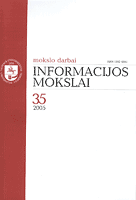Kokybės vadybos ir žinių vadybos sąsajų tyrimas
The study of the connections between quality management and knowledge management
Author(s): Juozas RuževičiusSubject(s): Economy
Published by: Vilniaus Universiteto Leidykla
Summary/Abstract: The aim of the article is to reveal the peculiarities and connections of quality management and knowledge management, their impact to the competitiveness of the organisations and to prepare a theoretical base for their possible integration. In the paper, there are presented detailed definitions of quality and total quality management (TQM) and some scientific aspects of the content of knowledge and TQM management. According to the author, the main area of the knowledge management is the organisational resources’ usage and development needed to reach the goals of the organisation. All knowledge should be managed – those, which are documented as well as the subjective, non-expressed ones. The direction of the organisation should establish and determine all the processes, related to the knowledge identification, creation, accumulation and dispersion. For that it is necessary to introduce the system of the storage creation, accumulation and support, supervision and knowledge division stimulation. Though TQM and knowledge management are very different, they have four main areas of similarities: their goals are similar, their attention areas are similar, their place in the organisational management is alike and the problems of the implementation financial benefits evaluation are resemble. The research made is forming the theoretical and methodological base for TQM and knowledge management possible integration.
Journal: Informacijos mokslai
- Issue Year: 2005
- Issue No: 35
- Page Range: 47-58
- Page Count: 12
- Language: Lithuanian

